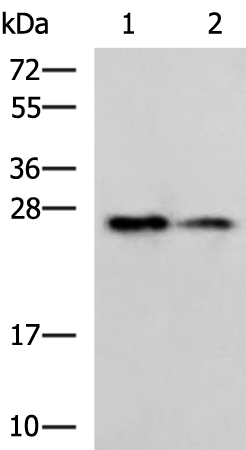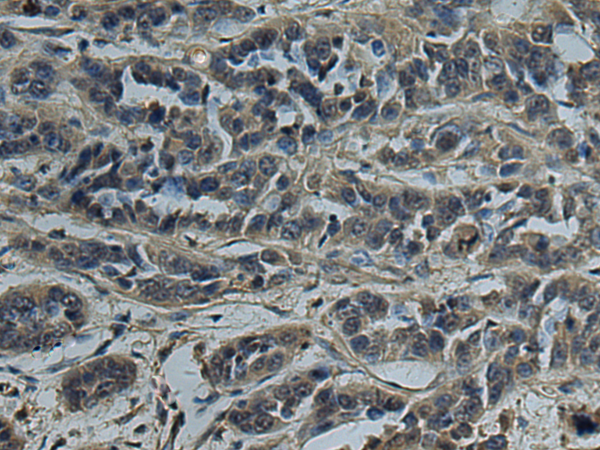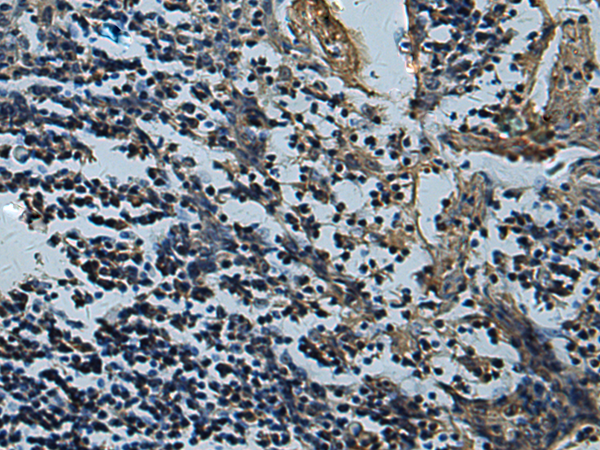


| WB | 咨询技术 | Human,Mouse,Rat |
| IF | 咨询技术 | Human,Mouse,Rat |
| IHC | 1/50-1/200 | Human,Mouse,Rat |
| ICC | 技术咨询 | Human,Mouse,Rat |
| FCM | 咨询技术 | Human,Mouse,Rat |
| Elisa | 1/5000-1/10000 | Human,Mouse,Rat |
| Aliases | DG6; PMBP |
| WB Predicted band size | 24 kDa |
| Host/Isotype | Rabbit IgG |
| Antibody Type | Primary antibody |
| Storage | Store at 4°C short term. Aliquot and store at -20°C long term. Avoid freeze/thaw cycles. |
| Species Reactivity | Human, Mouse, Rat |
| Immunogen | Fusion protein of human PGRMC2 |
| Formulation | Purified antibody in PBS with 0.05% sodium azide and 50% glycerol. |
+ +
以下是3-4条关于PGRMC2抗体的参考文献及其摘要内容的简要整理:
---
1. **文献名称**: *PGRMC2 is a critical regulator of cellular proliferation and hormone signaling in breast cancer*
**作者**: Hughes AL et al.
**摘要**: 该研究利用特异性PGRMC2抗体,通过免疫印迹和免疫组化分析,发现PGRMC2在乳腺癌细胞中高表达,并通过调控雌激素受体信号通路促进肿瘤增殖。抗体验证实验确认了其在细胞质和膜相关区域的定位。
2. **文献名称**: *Development and validation of a monoclonal antibody for PGRMC2 in metabolic studies*
**作者**: Zhang Y et al.
**摘要**: 本文报道了一种新型单克隆PGRMC2抗体的开发,并通过质谱和敲除细胞系验证其特异性。研究显示,PGRMC2在小鼠肝脏中参与脂质代谢调控,抗体在组织切片和蛋白质相互作用分析中表现出高灵敏度。
3. **文献名称**: *PGRMC2 modulates mitochondrial function and oxidative stress in neuronal cells*
**作者**: Smith J et al.
**摘要**: 通过PGRMC2抗体介导的免疫沉淀技术,研究者发现PGRMC2与线粒体复合物蛋白相互作用,调控神经元氧化应激反应。抗体在脑组织中的染色结果支持了其在神经退行性疾病中的潜在作用。
4. **文献名称**: *Progesterone receptor membrane component 2 (PGRMC2) as a biomarker in ovarian cancer*
**作者**: Lee S et al.
**摘要**: 该研究使用商业化PGRMC2抗体进行临床样本分析,发现其在卵巢癌组织中的表达水平与患者生存率负相关。抗体在流式细胞术和免疫荧光中的应用证实了其作为诊断标志物的潜力。
---
以上文献均涉及PGRMC2抗体的实验应用,涵盖癌症、代谢及神经科学领域,具体方法包括抗体开发、功能验证及临床关联分析。
The Progesterone Receptor Membrane Component 2 (PGRMC2) antibody is a research tool designed to detect and study the PGRMC2 protein, a member of the membrane-associated progesterone receptor (MAPR) family. PGRMC2 is a small, heme-binding protein implicated in diverse cellular processes, including steroidogenesis, cell proliferation, apoptosis, and metabolic regulation. It localizes to the endoplasmic reticulum, mitochondria, and plasma membrane, interacting with cytochromes P450 and other proteins to modulate signaling pathways. While its exact physiological roles remain under investigation, PGRMC2 is suggested to influence glucose homeostasis, lipid metabolism, and cancer progression, with studies linking its dysregulation to metabolic disorders and tumorigenesis.
PGRMC2 antibodies are typically developed in hosts like rabbits or mice using immunogenic peptides or recombinant protein fragments. These antibodies enable techniques such as Western blotting, immunohistochemistry (IHC), and immunofluorescence (IF) to assess protein expression, localization, and interactions in tissues or cell lines. Validation often includes knockout controls or siRNA knockdown to confirm specificity, given the structural homology shared among MAPR family members (e.g., PGRMC1). Researchers utilize these antibodies to explore PGRMC2's role in diseases like diabetes, obesity, and cancer, as well as its interplay with hormonal signaling and drug resistance mechanisms. Current studies aim to clarify its heme-related functions and potential as a therapeutic target.
×